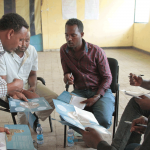
All countries in the world agree that every person is entitled to the human rights to water and sanitation. Most countries have made high-level commitments to ensure access to water and sanitation services for all people. Practically all countries in the world are struggling to achieve services for all.
Our aim is to show that using the human rights to water and sanitation in WASH sector practice can catalyse progress. You will find on this website:
In short: Everything you need to #MakeRightsReal!
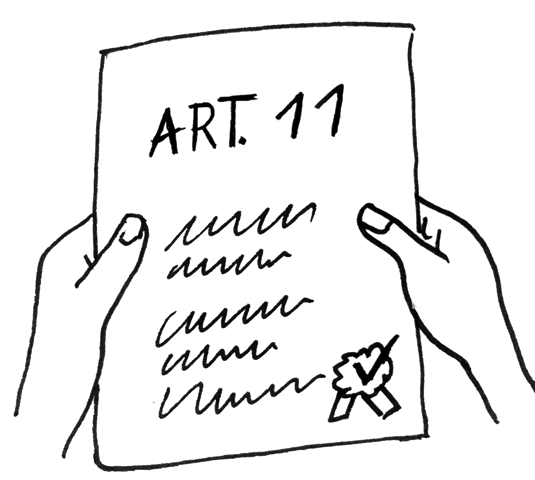
Financially supported by the Federal Foreign Office

Make Rights Real talk (#MRRtalk): In our three MRR talk formats, we give the floor to experts from practice and to you.
Talks explore a dedicated topic in a half-hour discussion, followed by a call-in part where you can share experiences and ask questions. Talks are availabe as podcasts below.
In the MRR talk: Open hour, a panel of renowend experts is there to engage with you on any questions or experiences you wish to share.
Interviews are quick reads featuring in-depth experiences from around the world.

Voice your opinion. Ask your question. Listen in.
In “MRR talk: Open hour”, a panel of renowned experts on working with rights is there to engage with you – and you can exchange with your peers too.
What’s on the Open Hour agenda? That’s up to you! Share challenges and questions you have on using human rights in your work on water & sanitation. Together, we’ll find an answer.
Our guest: Virginia Roaf (she/her) and Malesi Shivaji (he/him)




Episode 1: Get ready for human rights work
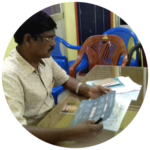
Listen to Bikash Kumar Pati and Malesi Shivaji about practical steps civil society organisations have taken to work with human rights.
PLUS // Quick read interviews on how to get ready for human rights work and on how to support (local) government to address systemic challenges.
Episode 2: Spotlight on strategies
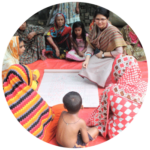
In this episode, we spoke with Partha Sarathi Kuntal and Alana Potter to explore different strategies civil society organisations use to push government institutions to realise water and sanitation services for all.
PLUS // Quick read interviews on the use of monitoring tools in support of working with human rights; legal activism as strategy and the Claim Your Water Rights campaign.
Episode 3: Your questions answered

Do rights need to be in the Constitution or the law? What value do rights have when government really has no resources? Are international human rights compatible with local traditions and customs?
For episode 3, we collected questions from you and spoke with Mohamad Mova Al’Afghani to answer them.

Episode 5: A healthy environment as a human right – what difference does it make?


Recently, countries recognised the human right to a clean, healthy and sustainable environment. In this MRR talk, we explored the use of local knowledge to understand and possibly address effects of climate change and environmental degradation. Also shed a light on the legal aspects of a healthy environment as a human right.


Recently, countries recognised the human right to a clean, healthy and sustainable environment. In this MRR talk, we explored the use of local knowledge to understand and possibly address effects of climate change and environmental degradation. Also shed a light on the legal aspects of a healthy environment as a human right.


Episode 8: A perfect match. How to combine human rights and system strengthening approaches
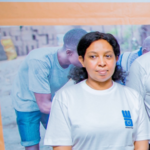

To date, systems strengthening and human rights-based approaches mostly exist alongside each other. Often the language of human rights or systems is used loosely by practitioners and researchers alike, without the accompanying depth of knowledge on the nuances of each area.

Listen to Bikash Kumar Pati and Malesi Shivaji about practical steps civil society organisations have taken to work with human rights.
PLUS // Quick read interviews on how to get ready for human rights work and on how to support (local) government to address systemic challenges.

In this episode, we spoke with Partha Sarathi Kuntal and Alana Potter to explore different strategies civil society organisations use to push government institutions to realise water and sanitation services for all.
PLUS // Quick read interviews on the use of monitoring tools in support of working with human rights; legal activism as strategy and the Claim Your Water Rights campaign.

Do rights need to be in the Constitution or the law? What value do rights have when government really has no resources? Are international human rights compatible with local traditions and customs?
For episode 3, we collected questions from you and spoke with Mohamad Mova Al’Afghani to answer them.

Voice your opinion. Ask your question. Listen in.
In “MRR talk: Open hour”, a panel of renowned experts on working with rights is there to engage with you – and you can exchange with your peers too. What’s on the Open Hour agenda? That’s up to you! Share challenges and questions you have on using human rights in your work on water & sanitation. Together, we’ll find an answer.



Publisher: WASH United gGmbH
Fuerbringerstrasse 7 | 10961 Berlin | Germany
Telephone: +49 (0)30 555 768 060
Email: info@wash-united.org